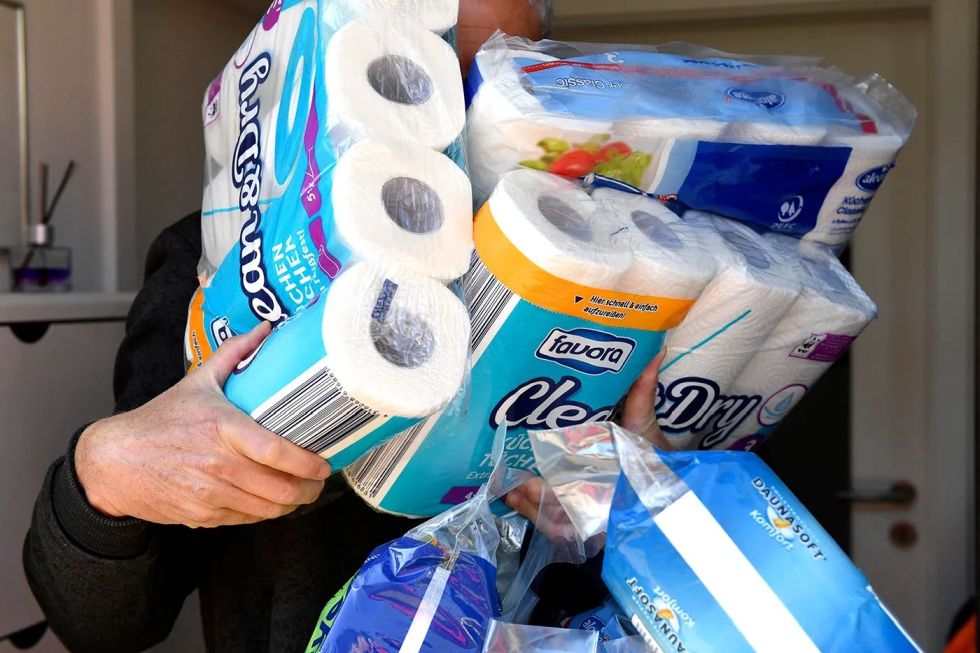What have you been given? We can only build the Kingdom of God when we share what we have with others. Everyone’s happiness depends on mutual sharing
Nineteenth Sunday in Ordinary Time – August 10, 2025
Today’s Gospel flows on from last Sunday where the rich young man was busy amassing great wealth instead of sharing. The Disciples were confused because, up until that time, wealth was seen as a blessing from God, while poverty or sickness were interpreted as a curse for some sin.
So, Jesus explains that people should sell their excess possessions (or share the income from excess properties) and help those with little or nothing. This is a bit like a voluntary taxation system. The First and Second Readings both prepare us for this difficult task: to sell what is excess is to place our trust in God= FAITH.
The COVID-19 period revealed a lot of peculiar behaviour: all around the wealthy countries, people were buying so much toilet paper (I guess they didn’t want to run out during the lock down!). Ha, ha. However, what did that do really: it meant other customers could not buy any toilet paper because the “lucky” few had taken everything available with no thought for others.
Chapter 12 of Luke can help explain why we have so much violence, war and loss of life around the world. As people lose trust in God (give up on Religion), then the conclusion is that we must provide for ourselves: the world is unpredictable so we must make a large provision for the future, and bad luck for those who miss out!: regressing back to survival of the fittest.
Let’s face it, toilet paper is convenient, but it is not a life or death “t-issue”. As we just marked the annual environment day, is toilet paper a simple example of “greed” and excess? In the past we used water, grass or both, and it’s better for the environment and healthy.
According to the US Forest Service, Americans use an average of 36 rolls per year= 27 billion rolls of toilet paper= 27,000 trees are cut down each day for toilet paper. We need trees to clean our air each night, but we sacrifice our “lungs” and global temperature rises for comfort. Let’s face it, 2/3 of the world population live in poverty and cannot afford toilet paper.
The production of toilet paper has a number of environmental impacts: cut 9.85M trees yearly (USA only); loss of wildlife habit and the release of greenhouse gases from the tress and from the energy required to process and produce the toilet paper; water consumption and pollution from the chemicals used to produce toilet paper. What about China, India, Japan, Australia, Canada, UK and Europe? https://plant4harvest.com/how-many-trees-are-cut-down-for-toilet-paper/
There’s a lot of out-cry about climate justice, reducing emissions, etc. by the wealthy countries: but almost all of the talk about is about what other people should do, and what the Government should do. What about us? What are we doing personally?
What can we encourage our community to do collectively so that we make a small impact, and be a model for others. I remember the Clean-Up Australia campaign started with one person, then a small group, and gradually it spread all over Australia and internationally.
We often think narrowly when we read the Gospels and fail to apply it to our daily living. Some of us might say: I don’t have excess, I’m looking after the grandkids, etc. etc. All true! But we should dig deeper into those things we do as a routine without thinking about them: like the toilet paper. What cost is it to us and our world? What could we do differently?
OK, maybe you find that item a delicate item to deal with. But what else could you do? Personally, I found the final words of the Gospel a little bit challenging:
The servant who knows what his master wants, but has not even started to carry out those wishes, will receive very many strokes of the lash. The one who did not know, but deserves to be beaten for what he has done, will receive fewer strokes. When a man has had a great deal given him, a great deal will be demanded of him; when a man has had a great deal given him on trust, even more will be expected of him.’
This week I encourage us to reflect: what daily ritual can we do differently?
Can we save power? e.g. turn off/on the heater/ cooler more/ less? Adjust the thermostat?
Can we save water? e.g. capture rain water in a tank for the garden? Reduce the tap pressure?
Reduce toilet flushes: yellow mellow, brown down?
Can we reduce costs & share the benefits? eg. reduce crisps/ wine/ beer/ coffee once per week?
Also, in our human relationships: who do we neglect to give time to, and choose to spend in the company of others? Do we build “bigger barns” (time) at work, and “small barns” at home?
Finally, let’s reflect on that line above:
When a person has had a great deal given him, a great deal will be demanded of him…
what have you been given? What have I been given? And what are we doing with it?
By Gerard Conlan, OMI


